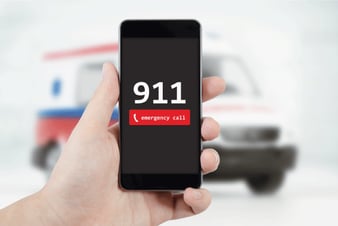 The phrase "911: What is Your Emergency?" is something we often take for granted and a comforting one when we need help! Whether it’s a fire & rescue, police or medical emergency service, precious seconds can seem like hours to those in a crisis situation and rightfully so... Rightfully so. In many cases, it is a matter of life or death.
The phrase "911: What is Your Emergency?" is something we often take for granted and a comforting one when we need help! Whether it’s a fire & rescue, police or medical emergency service, precious seconds can seem like hours to those in a crisis situation and rightfully so... Rightfully so. In many cases, it is a matter of life or death.
Did You Know?
- There are approximately 6,100 call centers throughout the United States handling approximately 250,000,000,000 (1/4 billion) calls annually. Each call center operates continuously around the clock every day of the year. A typical call processing goal is 90 seconds or less which probably feels like a lifetime to a caller.
- A 60-second delayed response means a 10% decrease in the chance of surviving a heart attack.
- Each year more than 2,500 people die and 12,600 are injured in home fires in the United States, with direct property loss due to home fires estimated at $7.3 billion annually. In less than 30 seconds a small flame can get completely out of control and turn into a major fire.
- Police dispatchers reported that when 911 calls are placed via cell phone, as much as 63% of the time, the dispatcher does not have the technology to provide police officers with the caller's exact location. This causes a drastic increase, sometimes an additional 20 minutes or more, in police response time.
A Vital Process
A 911 Call Operator is tasked with the initial triage of all calls received and determines what type or types of emergency services are required: police, fire & rescue, or emergency medical service. Operators are trained to address both emergency and non-emergency calls. Callers cross a wide spectrum young and old, coherent and incoherent, calm and hysterical, and proficient in the caller’s language. Operators provide a screening service to sort out those calls that require an emergency response, an immediate response, a routine response, or no response. Prior to electronically transferring the information to the appropriate dispatcher(s), an operator must gather and enter certain information (name, type of emergency, etc.) in a Public Safety System—a complex and tightly integrated software system to collect information and manage emergency calls. Once entered, it is transferred to a pick-up queue where a 911-Dispatcher notifies the appropriate resources: police, fire & rescue, or emergency medical service.
No doubt 911 Operators have one of the most stressful jobs in America. They listen to life’s worst moments each and every day. Not only must they think at lightning speed, but they must also act even more quickly. They are experts at keeping calm and keeping the caller even calmer. To do this, 911 dispatchers rely on a variety of complex systems which must work together seamlessly to provide the most efficient real-time services possible. Neither operator, dispatcher or caller can afford for these systems to be down. Critical information and their systems must be continuously available.
Solutions II to the Rescue for Public Safety Organizations
Solutions II utilizes its Adaptable Data Center® Framework to ensure successful digital transformation and works diligently behind the scenes of many of our nation’s emergency call centers ensuring their systems are highly available and reliable so a 911 Operator can perform calmly and efficiently in all situations. It is an honor to team with our nations call centers, emergency responders and technology partners to make sure every second counts.

JOIN the 911 BEST PRACTICES GROUP on LINKEDIN to network with your Peers!




Comment Form